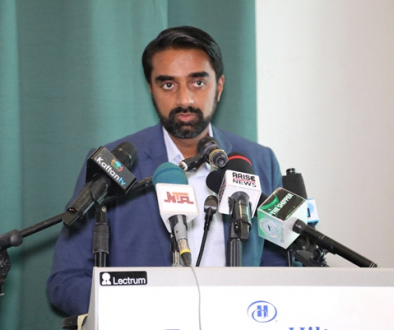How Can I Choose Integrity and Win in the Maritime Sector: An MACN Nigeria Stakeholders Webinar
The webinar was organized by The Convention on Business Integrity and the Maritime Anti-corruption network with support from DANIDA.
The objective of the webinar was to
- Underscore the grievance reporting mechanism and its importance in the reformation process of the maritime sector
- Experience sharing on past consequence management within the industry with the intent to encourage more reporting.
The panel members were:
- Mr Demola Bakare- Director & Head of International Cooperation – ICPC
- Mr Vivek Menon- Head of Collective Action and Partnerships (EMEA) (MACN)
- Mr Soji Apampa- CEO, The Convention on Business Integrity
Mr. Apampa gave a broad definition of Integrity – Doing the right things consistently and doing things right consistently.
Issue 1: Based on this definition of integrity, is it possible in the maritime sector and what are the barriers to choosing integrity?
The different interactions between ship crew and port agencies leaves the ship crew helpless because their business is time bound and in other to avoid unnecessary delays, they might sometimes compromise on their principles. There is a lack of transparency on the part of port agencies
Recommendation: Port users/ actors should voice their complaints through appropriate channels to seek redress to issues that affect them.
Issue 2: The Maritime industry is a goldmine and the mismanagement of the sector has impacted negatively on the ease of doing business at the ports. What is responsible for this? This could be as a result of poor enforcements of rules which leads to disincentives to trade, human issues caused by both Port officials and actors at the ports coupled with weak consequence management system. These issues were highlighted in the Risk Assessment survey conducted by ICPC and some partners in 2012. Some of the Risks highlighted were
- Policy / regulatory challenges
- Multiple roles played by different agencies
- Human factor- manipulation and official collusion- bribery and corruption based on pressure
- Lack of consistency in port procedures
Remedial actions based on identified risks
- Addressing the issue of apathy through- Grievance management system- encouraging port actors to report an incidence when there is an infraction
- The harmonization of the SOP for all the port agencies
- Training of officials at the ports on doing things right and well
- Draft of anti- corruption policies/ code of conduct for all port agencies/ officials
- Introduction of the PSSP- Ports service portal- web- based Portal that has all the SOPs of all port agencies as well as being used as a tool to register grievances at the Ports.
- Impunity of the past has been addressed, consequence management has been set into motion
ICPC is currently monitoring the compliance of the Grievance report mechanism and can attest to the turnaround of addressing complainants, which is within 24 – 48hours. ICPC would only intervene when the issues have not been addressed after 7 days.
Recommendations
- There should be more awareness/ publicity about the Grievance Reporting Mechanism and the PSSP portal and its usage
- There is need for more collaboration and support from diverse stakeholders in terms of Ethics training, capacity building, etc.
- The ease of doing business policy laid down by the Federal Government must be enforced.
Issue 3: Can the system cope with an explosion of complaints from the GRM?
The system has the capacity to cope with the explosion of complaints. As long as a system can cope with explosion of business, they should also be able to cope if there is an explosion of complaints and how to address them.
Issue 4: Based on the survey conducted by MACN, is there a pattern to the complaints by port users and are the challenges with compliance based on location/ agency?
The issues were predominantly on:
Documentation
- Passports and sea clearance papers.
- Customs clearance on Ports vessels.
Inspection
- Related to inspection of ships and controls at the Ports
Though there are challenges within the ports, it exacerbates the further users move away from the ports.
Issue 5: How aware are ship captains of the GRM?
More companies are becoming more aware and are using it. Based on available data between August 2019 to November 2020, out of 34 calls made by ship captains, 15 were serious issues which were all resolved within a few hours.
In conclusion, it is possible to choose integrity and win in the maritime sector. In addition there is a support system provided by the ICPC, MACN, CBi and other related agencies working together in the maritime sector.
Always remember the 3 Cs.
- Choose: You have a choice to voice out when the need arises
- Complain: You can take your complaints to the relevant platforms to seek redress by referring to the principles as stipulated in the SOPs
- Change: In seeking redress, the issues are addressed and the situations eventually changes
NEXT STEPS
- We need more ambassadors of change to champion the reforms at the Ports
- More publicity/ awareness of the platform/usage for the GRM and PSSP
- Support the ease of doing business initiative of the Federal Government through the reforms at the Ports
- Ports users are encouraged to use the helpdesk to report infractions. The helpdesk has a dedicated manager and has a track record of resolving issues within 1- 4 hours: Call: +234 907 101 3336; +234 818 738 0696 or Email: helpdesk@cbinigeria.com and macn@bsr.org
- The Maritime Anti-corruption network has a manual and willing to provide assistance and support to companies to take their staff through the course on how they can use the system (helpdesk) effectively
- Ports users are encouraged to download the user experience diary on their phones- HERE and give reports on their experiences at the ports. The diary is a tool to capture the challenges encountered in the ports and the data will be analyzed to help resolve the issues.


